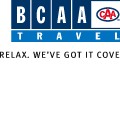Part 1
Steve: This morning, I'm speaking with Colin MacPhail, who is the Director of Membership Services at the BCAA, which stands for? Colin: British Columbia Automobile Association.
Steve: Now, I guess in the minds of the average person, they identify BCAA with being stranded on the roadside somewhere and being able to call in and get help, which I think is part of the service that you provide, but I don't think it's the whole story. Maybe you could tell us a little bit about both that aspect of what you do, and also the full range of services that you provide to the public.
Colin: Absolutely. We're definitely known more for our roadside assistance than anything else. We're very famous for being the club that's there when your car breaks down. Everyone knows about AAA and CAA, and what happens if your car breaks down? You phone us, and we'll help you through it, but we're trying to get known for a lot more than just our roadside assistance, because when you buy a new car or other things, we don't want you dropping our services just because you don't feel you don't need roadside assistance anymore. We want you to find value in membership regardless of your roadside assistance needs.
Steve: How many members do you have right now?
Colin: We are now at 750,000 members in British Columbia, and several more millions of that in Canada, and about 44 million overall in Canada, the U.S., and worldwide, so a pretty big organization.
Steve: So that means the BCAA is part of the CAA and is part of this International Automobile Association network?
Colin: Yes, that's correct, so if you drive to the rest of Canada, or to the United States, and you break down, you'll be covered wherever you are. We're part of a large organization. Steve: So then, is this then a private company or is it a co-op, or just how is it organized?
Colin: Actually, we are not a private company or a public company. We're governed under the Societies Act, which is something different again. It's because we started off as an auto club, a club of members. So, we're actually a not-for-profit organization, so what we do is for the benefit of our members. Steve: That's 750,000 people in British Columbia. That would be a significant percentage of the driving public. Have you any idea what sort of a market share you have, and is it all people who drive cars, or are there people who are members who are not motorists?
Colin: We have about thirty to forty percent of the driving public as members, and most of the members do drive, and that's still the primary driver-excuse the joke-still the primary reason for becoming a member, but we do have some members who join and stay just for the additional benefits-our travel services, our insurance services, plus our "Show Your Card and Save" program. So it goes beyond just the roadside assistance.
Steve: What was that last one, "Card something-or-other and Save?" Could you describe that?

